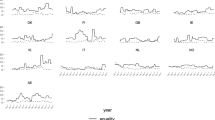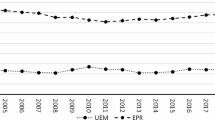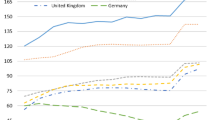Abstract
We assume that individual voters differ not only according to age but also productivity. In the steady state, workers with wages in the intermediate range join the retired persons to form a majority and vote for a positive level of social security. When a shock decreases population growth, entrenched interests can constrain majority voting decisions and prevent reforms in the name of entitlements. We show that from a Rawlsian viewpoint it may be desirable to rely on these entitlements to protect the low wage earners of the transition generations. However, when the possibility of fixing a basic pension is introduced, it constitutes a better instrument than entitlements.
Similar content being viewed by others
References
Boadway, R.W. and D. E. Wildasin. (1989). "A Median Voter Model of Social Security." International Economic Review 30, 307–328.
Boldrin, M. and A. Rustichini. (2000). "Equilibria with Social Security." Review of Economic Dynamics 3, 41–78.
Browning, E. K. (1975). "Why the Social Insurance Budget is Too Large in a Democracy." Economic Enquiry 13, 373–388.
Casamatta, G. (2000). "The Political Power of the Retirees in a Two Dimensional Voting Model."Working Paper, GREMAQ, Universit´e de Toulouse.
Casamatta, G. H. Cremer and P. Pestieau. (2000a). "Political Sustainability and the Design of Social Insurance." Journal of Public Economics 75, 341–364.
Casamatta, G., H. Cremer and P. Pestieau. (2000b). "The Political Economy of Social Security." Scandinavian Journal of Economics 102, 503–522.
Cremer, H. and P. Pestieau. (2000). "Reforming Our Pension System: Is It a Demographic, Financial or Political Problem?" European Economic Review 44, 974–983.
Disney, R. (1996). Can We Afford to Grow Older?. Cambridge, Ma: The MIT Press.
Grossman, G. M. and E. Helpman. (1998). "Intergenerational Redistribution with Short-lived Governments." The Economic Journal 108, 1299–1329.
Hu, S. C. (1982). "Social Security, Majority-Voting Equilibrium and Dynamic Efficiency." International Economic Review 23, 269–287.
Mulligan, C. B. and X. Sala-i-Martin. (1999). "Gerontocracy, Retirement, and Social security." NBER Working Paper No. 7117.
Tabellini, G. (2000). "A Positive Theory of Social Security." Scandinavian Journal of Economics 102, 523–545.
Author information
Authors and Affiliations
Rights and permissions
About this article
Cite this article
Casamatta, G., Cremer, H. & Pestieau, P. Demographic Shock and Social Security: A Political Economy Perspective. International Tax and Public Finance 8, 417–431 (2001). https://doi.org/10.1023/A:1011214823251
Issue Date:
DOI: https://doi.org/10.1023/A:1011214823251




